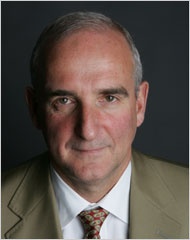| VOAL - Online Zëri i Shqiptarëve | ||||
|
AMERIKA PAS IRAKUT Nga ROGER COHEN, New York Times E Shtunë, 09.04.2010, 06:55pm (GMT1)
Evropa iu përshtat moti, jo pa dhembje, vendit të zhdukur të saj në çështjet botërore. Pas Kanalit të Suezit për britanikët, dhe Algjerisë për francezët, u avulluan edhe iluzionet më kokëforta të pas Luftës së Dytë Botërore. Stafeta i kaloi Amerikës. -- September 2, 2010 Obama's Post-Iraq World By ROGER COHEN LONDON "” Europe adjusted long ago, but not without pain, to its diminished place in world affairs. After Suez for the British, after Algeria for the French, even the most stubborn post-World War II illusions evaporated. The baton had passed to America. European nations set their minds to a war-banishing Union. I don't think the Iraq and Afghan wars constitute for the United States what Suez and the Algerian conflict were for Britain and France: points of irrevocable inflection. But, inconclusive and ill-managed, they have set new limits to U.S. power. President Obama is focused on reducing American expectations for "an age without surrender ceremonies." That's how he defined our epoch in an address winding up the seven-year U.S. war in Iraq. It was a quintessential Obama speech "” intelligent but not stirring, firm and sober and rather solemn, altogether in the image of his refurbished Oval Office with its risk-averse muted neutral tones. As with the office so with the speech: You can admire the clean lines but your heartbeat sure won't quicken. The main subject, it must be said, hardly lent itself to hurrahs. In Iraq, brief triumph subsided through criminal incompetence into fractured mayhem, leaving more than 100,000 Iraqi civilians dead and concluding in the fluid uncertainty of sporadic violence and democratic deadlock. No intellectual contortion "” even with important stirrings of political give-and-take in Iraq "” can ever inscribe Operation Iraqi Freedom in the annals of U.S. victories. An age without surrender ceremonies is just that: an age without clear winners, an opaque time. Obama put the situation this way: "One of the lessons of our effort in Iraq is that American influence around the world is not a function of military force alone. We must use all elements of our power "” including our diplomacy, our economic strength, and the power of America's example "” to secure our interests and stand by our allies." Power, in this Obama doctrine, is not for winning the day, vanquishing the enemy. Its purpose is more modest: the pursuit of America's interests or those of its friends. Obama is a realist in the image of Britain's 19th-century statesman Lord Palmerston, who once declared: "We have no eternal allies and we have no perpetual enemies. Our interests are eternal and perpetual, and those interests it is our duty to follow." What inhabits Obama is the conviction that the United States "is still the biggest power but not the decisive power," said Jonathan Eyal, a British foreign policy analyst. "And Americans will only accept that with time and with bumping against buffers." This is not the stuff of heroic American narrative, of shining citadels or beacons to mankind. Obama, subtly but persistently, is talking down American exceptionalism in the name of mutual interests and mutual respect, two favorite phrases. He is downsizing American ambition "” the eventual Afghan exit is now pre-scripted along neither-defeat-nor-victory Iraqi lines "” in the name of American rebuilding. Here is where Republicans are going to batter him all the way to 2012. They are going to batter him in primary colors, not Oval-Office creamy tones. They are going to call him an equivocator. They are going to say he compromised with the Islamist radicals rather than defeating them as America defeated Nazism or Communism. They are going to accuse him of selling American power short. They are going to cast him as a peacenik light on patriotism. They are going to call him the socialist-secular sermonizer who wants to steer America to Euro-sclerosis. In fact, of course, they've already started. Just listen to the Republican hopefuls these days "” Islam-obsessed Newt Gingrich who sees creeping Shariah law in New Jersey, or Mitt Romney who thinks Obama's sold out to the Russian bear, or raging Sarah Palin, or even the modest Midwesterner Tim Pawlenty who has been deploring Obama's "weak or equivocal signals." The next presidential election (the mid-terms are already largely lost for the Democrats) will not be decided on these issues. The core question will be whether the U.S. economy has rebounded. But Obama is vulnerable to the equivocator argument "” an image lodged in European minds since the laborious decision on the Afghan surge. He's vulnerable to suggestions he's abandoned the heroic narrative inseparable from the American sense of self. Logic is on his side. As Obama noted, more than $1 trillion have been spent on war since 9/11. That's one reason the U.S. economy, deep in the red, is skewed in ways that will take years to overcome. A scaling-back, a reconsolidation "” these are prerequisites of the revival of which America remains capable. But logic does not win elections. The heroic in Obama's 2008 victory was self-evident. It's spent. America is not quite where Britain was in transitioning from colonial empire to the independent association of the Commonwealth, but its difficulties place Obama in a similar business of curtailment, retrenchment and bridge-building. His political dilemma may come down to this: how to quicken pulses again while continuing to pull America out of wars, rather than plunge it into a new and disastrous one, in Iran for example. www.voal-online.ch
|
||||
| Copyright © 2005-2008 Nulled by [x-MoBiLe]. All rights reserved. | ||||
